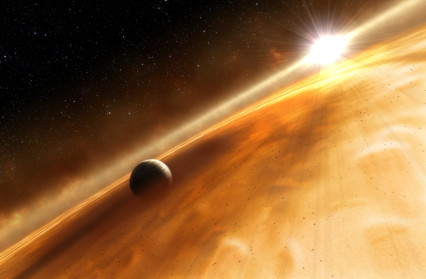BBC National Orchestra and Chorus of Wales
St David’s Hall, Cardiff, 18 April 2015
Mark Bowden: A Violence of Gifts (world premiere)
Gustav Holst: The Planets
Soprano – Elizabeth Atherton
Baritone – Roderick Williams
Conductor – Martyn Brabbins
The BBC National Orchestra of Wales has an admirable tradition of working with composers in residence and in association. Its current composer in residence is Mark Bowden, who comes from Abertillery and who already has a sizeable international reputation. This concert saw the world premiere of A Violence of Gifts, an effective and striking work on the subject of Creation, thoroughly informed by Haydn and Enlightenment thinking, and setting a newly-commissioned text by the Welsh poet Owen Sheers, whose Pink Mist won last year’s Wales Book of the Year.
Just as Haydn went to see Sir William Herschel in his observatory for inspiration for The Creation, Owen Sheers and Mark Bowden went to the Large Hadron Collider below the Franco-Swiss border to gain information about current research into the Big Bang and other primal matters. The opening of the piece, ‘Intrada’, sung by the huge and beautifully-disciplined BBC National Chorus of Wales, set words in many languages expressing the idea of being and beginning. This was followed by a soprano solo, sung by Elizabeth Atherton, on the ‘relic of ancient light’ which becomes the source of all creation. The chorus’s response was to sing the names of the various creators, from Brahma to World Pillar – one example among many of text that failed to carry as much emotion as intellectual weight. Singing the words (or initials) ‘DNA’ and ‘RNA’ may look fine on the page, but is hard to pick up by ear, and one wonders whether ‘DSS’ and ‘RNIB’ might not be equally effective as text.
Roderick Williams, a baritone who is no stranger to contemporary music, and who brings to his interpretations a beautifully bronzed and rounded tone as well as the greatest clarity of diction, sang the next main section ‘Imagine this moment’ antiphonally with the soprano. Here both lines of text interwove effectively with delicately-scored orchestral textures, and led to the conclusion of the first half with a chorus hymning ‘gravity’s collapse … the resurrection of light.’
In the second part, ‘Theia’, the baritone continued with the theme of the violence implicit in the act of creation, and the way in which creation’s forces chain matter and being, rather than liberating it. With beautiful horn passages, and threadlike string arpeggios, the soprano replied with the words, ‘It is not answers we seek/ but questions’, and the chorus, Greek-tragedy style, commented on her observations and on those of the baritone who reiterated her statement. The piece concluded with the chorus singing ‘Come now, lonely pioneer, in your company of all’, against a background of string harmonics, a whispery, diaphanous texture of sound that fitted the mysteries, half-formed and half-stated, of Owen Sheers’s text.
Gustav Holst’s The Planets is a hundred years old – or so, depending on when you date the work’s completion – and a performance is apt for a time of remembering both First and Second World Wars. As conductor Martyn Brabbins emphasised in his spoken introduction to this concert, live-broadcast on BBC Radio 3 (now available on BBC iPlayer), any politician contemplating going to war should listen to the ‘Mars’ movement and think again. With its stubborn ostinato figure on percussion, and the drumming of bows on strings in the technique called col legno or ‘on the wood’, the symphonic suite opened with its most dramatic and terrifying moment, a devastating attack on war and violence.
But the continuation of the work was no anticlimax, as the movement celebrating Venus, here described as ‘Bringer of Peace’, became a sensuous pastoral with flute quartet, far more evocative to my ear of Venus the goddess of love than anything to do with peace and tranquillity. ‘Mercury’ was a fleet-footed scherzo, opening with muted strings playing a rapidly-reiterated figure. ‘Jupiter’, the movement that everyone remembers, if only because Holst poached his own melody as the tune for the hymn ‘I vow to thee, my country’, was in fact far less a bombastic exercise in sub-Elgarian jingoism, and far more a celebration of joviality and Falstaff-like merriment.
‘Saturn, the Bringer of Old Age’, was solemn with its pair of tubular bells, and had the deepest and most melancholy message of the suite: the organ pedal (played by Robert Court, perched on the rookery loft of the splendid St David’s Hall organ) giving a sepulchral tone. ‘Uranus, the Magician’ was a trickster figure in a second scherzo-like movement, and The Planets concluded with ‘Neptune, the Mystic’; a glorious exercise in virtuosic diminuendo to the quietest possible pianissimo, with the ladies of the BBC National Chorus of Wales singing almost inaudibly behind the slowly-closing auditorium doors.
Image Credit: ESA, NASA, and L. Calcada (ESO for STScI)











